MercoPress. South Atlantic News Agency
Tag: Guido di Tella
-
Sunday, September 17th 2023 - 08:09 UTC
“The Falklands problem is not the Islanders or the English, but us Argentines,” points out Cisneros
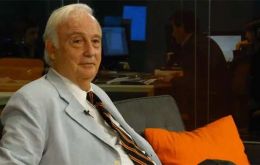
The Falklands/Malvinas will eventually be returned to Argentina but that is going to be a long, long road, forecasted Andres Cisneros a retired Argentine diplomat expert in the Falklands/Malvinas dispute and deputy foreign minister with Guido Di Tella in the nineties.
-
Monday, February 15th 2021 - 09:38 UTC
Ex president Carlos Menem, political wizard and bon vivant dies aged 90

Former Argentine president Carlos Menem died at the age of 90 on Sunday in a clinic in Buenos Aires, where he was admitted in December with a urinary tract infection. The president ruled Argentina during a time of short-lived economic stability and he enjoyed an often flamboyant lifestyle.
-
Monday, November 26th 2018 - 08:38 UTC
Falklands/Malvinas air link and Cordoba stop over underlines “the historic reconciliation of UK and Argentina”
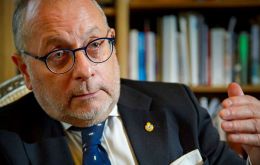
Argentina's foreign minister Jorge Faurie said that this week's G20 leaders' summit in Buenos Aires not only will it be historic since for the first time a meeting of such significance is taking place in South America, but also because of the symbolic reconciliation and constructive attitude between Argentina and the United Kingdom referred to the Falklands/Malvinas Islands.
-
Thursday, May 26th 2016 - 06:19 UTC
Falkland Islanders must be addressed ”as Argentines or foreigners living in (mainland) Argentina”
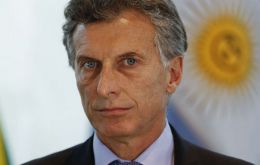
The Falkland Islands and Falkland Islanders must be addressed as if they were Argentines or foreigners living in mainland Argentina, which means a more “normal relation” with the Islands including extending healthcare services, education and even greater air connectivity, according to the latest column from Martin Dinatale, editor in chief of La Nacion who in a previous piece revealed the “humanitarian approach” the government of Mauricio Macri has in mind on the Falklands/Malvinas dispute.
-
Friday, May 20th 2016 - 11:23 UTC
Six presidents asked to testify of ex president Menem's son death in 1995
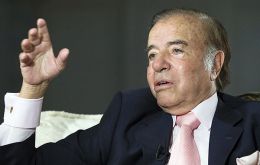
An Argentine court on Wednesday asked six former presidents to testify in the investigation into the 1995 death of the son of ex-president Carlos Menem. The court requested the testimony of Fernando de la Rúa, Ramón Puerta, Adolfo Rodríguez Saá, Eduardo Camaño, Eduardo Duhalde and Cristina Fernández. All followed Menem as presidents after his 1989-1999 rule.
-
Thursday, May 19th 2016 - 07:12 UTC
“Humanitarian approach”, the new Falklands' policy of the Macri administration
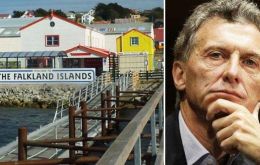
“Humanitarian approach” is how Argentine diplomacy plans to implement policy towards the Falkland Islands including greater air and sea contacts, which could lead to open trade, convincing Mercosur members to lift the ban, plus offers of specialized medicine and higher education opportunities for Falkland Islanders.
-
Tuesday, February 23rd 2016 - 07:52 UTC
Falklands/Malvinas, an advance to celebrate
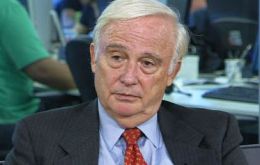
By Andrés Cisneros (*) - With the reinstatement of the 'impasse' on the issue of the Malvinas Islands, the Argentine government has made a wise decision. Not only because it puts in course again something proven useful in the past, but also because, looking into the future, there is no better path to the solution of the problem. It's not the mere restoration of a policy (good or bad) which already happened.
-
Friday, December 11th 2015 - 07:24 UTC
Welcome Mauricio! But what exactly are your plans?

By Graham Bound, London - Mauricio Macri: I roll the syllables of that rather pleasantly alliterative name over my tongue as I draw him into one of my columns for the first time.
-
Thursday, July 3rd 2014 - 07:02 UTC
Cobos Falklands' trip receives praise: challenge for all Argentina presidential hopefuls
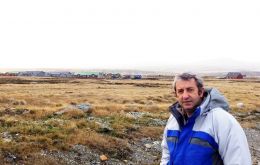
Despite Argentina's news agenda is absorbed by the World Cup, another possible default and the indictment for corruption of Vice-president Amado Boudou, the Argentine media still has time to talk about former vice-president and presidential hopeful Julio Cleto Cobos' current trip to the Falkland Islands.
-
Tuesday, November 22nd 2011 - 17:51 UTC
Oil might lubricate the process to real dialogue in the South Atlantic

The second of a planned series of extended political articles written exclusively for the Penguin News web site by Deputy Editor John Fowler.
